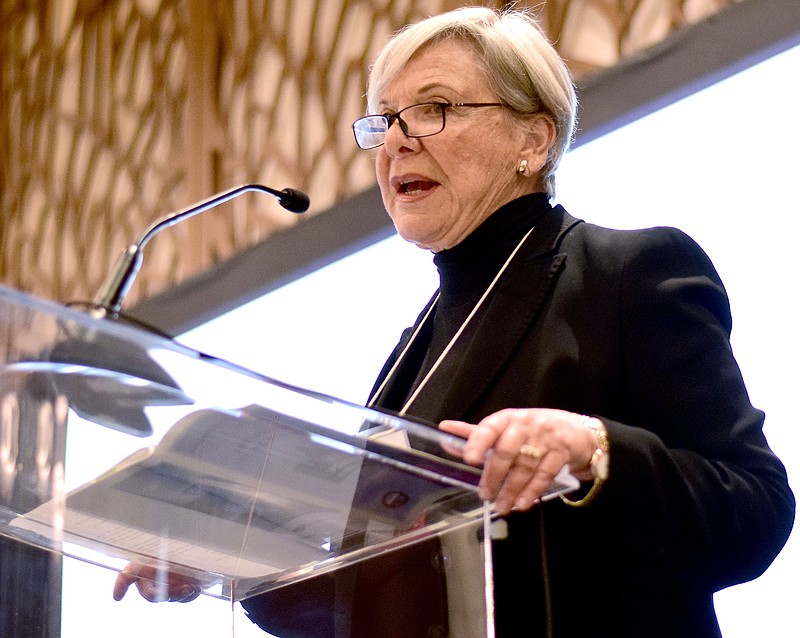Chattanooga is one of a handful of U.S. cities chosen by a national nonprofit group promoting city-led efforts to provide more consumer education and protections against predatory lending.
Mayor Andy Berke said he is launching a consumer financial protection planning effort in partnership with the Cities for Financial Empowerment Fund (CFE Fund) and the Annie E. Casey Foundation, which have already provided more than $42 million in grants to 82 U.S. cities for consumer counseling and assistance programs.
Berke said the city will begin an education campaign to raise consumer awareness of scams and predatory practices of businesses use, especially as many residents are experiencing financial distress from the coronavirus pandemic.
"Even before COVID-19 impacted our community, Chattanoogans were turning to predatory lenders," he said. "Now, more than ever, as many are looking for solutions to help with financial stress it's essential we educate our residents to the scams and fraudulent activity out there, and provide them with ways to protect themselves."
In the coming months, Berke said the city will roll out a multi-pronged approach that supports broader consumer financial protection capabilities to complement Chattanooga's Economic Mobility plan, prioritizing payday lending alternatives and supporting family financial education programs.
Chattanooga has adopted zoning regulations to limit the number and location of payday lenders in the city, but state law precludes local governments from regulating or banning payday lenders. Earlier this year, the Chattanooga City Council unanimously approved a resolution urging the Tennessee Legislature to lower maximum interest rates on payday loans, but that measure was not adopted by the General Assembly in their abbreviated session this spring due to the coronavirus.
Chattanooga City Council member Carol Berz, who is also chair of the Chattanooga Mayor's Council on Women, has been a long-time critic of payday loans, claiming such loans cost borrowers too much, are too frequently rolled over and often hurt, rather than help, consumers meet their budget needs.
"Unfortunately as a city, we are preempted from regulating these businesses and the only way we could impact the spread of these payday lenders at all is through our zoning regulations," Berz said. "Much like liquor stores, we were able to get some zoning restrictions on where payday lenders could operate, but the real problem is that for some people there just isn't an alternative to these high-interest loans."
Berz and City Council Chairman Chip Henderson said they support programs to help limit predatory lending and aid those in financial need to obtain necessary credit in ways that don't trap them in a cycle of debt.
"I think the city does have a role in helping to protect the most vulnerable and in helping our constituents with their basic needs," Henderson said. "We shouldn't be trying to pick winners or losers or running the economy, but this is an area of need."
A study by the Mayor's Council of Women three years ago said Tennessee's disproportionately higher number of payday lending stores may be linked to the state's above-average bankruptcy rate. Tennessee consistently ranks among the top states in the share of persons filing for bankruptcy.
Chattanooga will join Detroit, Philadelphia, St. Paul, Minnesota and Shelby County, Tennessee as the second cohort of the CFE Fund's Local Consumer Financial Protection Initiative, which supports local governments across the country in developing and enhancing their capacity to offer their residents consumer financial protection and empowerment.
"As we our building our action plan, we will likely work with some members from our Chattanooga Dream Steering Committee, which was already looking into alternatives to predatory lending options prior to COVID-19," said Richel Albright, a spokeswoman for Mayor Berke. "This is a nine-month cohort of cities working together."
Berke said Chattanooga will work with the CFE Fund to plan for the establishment of a local consumer protection agency, which will work to protect consumer assets through licensing, regulation, enforcement, mediation, and outreach and education.
"It is an unfortunate reality that predatory actors look to take advantage of vulnerable people during times of crisis like the current COVID-19 pandemic," said Jonathan Mintz, president and CEO of the CFE Fund. "Examples of scams, frauds, deceptive advertising, and price gouging are already occurring across the country. Local governments have a critical role to play in protecting residents' hard-earned assets, and we are thrilled to partner with Mayor Berke on this important work."
The city of Chattanooga has received a $10,000 grant, paired with a nine-month technical assistance engagement partnership, to begin planning for a local consumer financial protection initiative.
"We will be looking at partnering with as many external organizations as possible to carry out the goal of the grant," Albright said, noting that the effort will align with existing city departments that already help families with financial stability and security efforts such as the Office of Family Empowerment, Youth and Family Development and the Chattanooga Neighborhood Enterprises.
Contact Dave Flessner at dflessner@timesfreepress.com or at 757-6340
